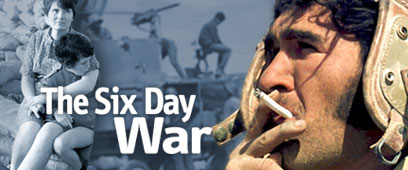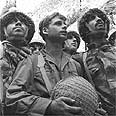

At the Western Wall for the first time
I jumped for joy when my very first passport came in the mail. I had my visa and my tickets. Now began the count down to my June 5th flight to Israel where I would spend four whole months visiting the large family I had never met before plus touring Israel, border to border. That was mid-May, 40 years ago.
The grand plan was to join my Mom in Israel for a month. After that, Mom would return from her two-month visit, and I would stay another three months on my own. At 21 that was a major adventure for a small-town American girl – all my friends were in awe of my bravery - and jealous of my pending adventure!
Our plans had changed drastically toward the end of May as war threatened with each passing day. Although my Mom wanted desperately to stay, the Israeli government did not want to take responsibility for tourists. With deep regret she arrived back to JFK airport in New York May 31st. Meanwhile, I was informed that my visa would be on hold till further notice.
Aside from letters, there was little connection to our Israeli family and friends – few of them had telephones then. And so, we waited, listened to the news and prayed. The eyes of the world were on Israel. Abba Eban became a household name. We waited, listened to the news, and prayed.
Four weeks after Mom’s return, we were at JKF airport again. This time to say good-bye to me! With pride and nervous anticipation I was en route to little Israel for the biggest adventure of my lifetime! I fell in love with Israel instantaneously – a love affair for all time.
Naturally, my plans had also changed with the war. I would no longer lounge for four months, touring and getting to know my Israeli family. After initial introductions to family in Haifa, I went to the Jewish Agency to volunteer. I was given three choices:
- Work for the Army three days a week
- Volunteer for a religious kibbutz or
- Volunteer for a small moshav (farming village)
I wanted something seven days a week. That left the Army out. I wanted unrestricted freedom on “the weekends” so I respectfully declined the religious kibbutz. Two down.
Life on the moshav
“Which moshav?” I asked. The answer was “Moshav Balfouriya”. I was stunned! Of all the moshavim I was about to volunteer in the very moshav my paternal grandparents, aunts, uncles and cousins had come to from Germany in 1934!
My grandmother, for whom I am named, is buried in Balfouriya. At the time, my grandfather built the first 2-storey home in the entire region. He had hired engineers from the Israel Institute of Technology, the Technion to build it with materials he brought from Europe! I couldn’t contain my excitement – wait till my father learned of my assignment!!!
Everyone helped me lug my two huge suitcases to the bus, onto the bus, and off again at the stop by the narrow road leading into Balfouriya. I remember standing there in the burning sun, taking in the vista of my grandparent’s village, the hills of Nazareth in the distance. Walking onto that road led to a journey of love, loss, illness, joy and hope the likes of which I have never known since.
When Zevick saw me in the office waiting to be assigned to a family he jumped up and said (in Hebrew of course) “we want her – I want her”! He was asked if anyone at home spoke English. To which he answered (in English of course) “I do!!” And so, I followed Zevick to his mother’s house, just next door.
Chaika was a widow with three children; Zvika who was in the Army and engaged to be married, Zevick – just 18 and already called to the Army in a couple of months, and Mira 14. In an attached “apartment”, lived their very old savta (grandma). My job would be to pick fruit from 5am till 1pm. I was one of only 13 volunteers assigned to Balfouriya, representing about 5 different countries.
There was Herbie from Glasgow (no one could understand him, not even me!), Cindy from London, Juneau from Paris and others – each of us had put our lives back home on hold to volunteer for Israel. Not one of us had ever grown up without a TV, a car - or two, a telephone!
But we did our part, became friends and fell in love with Balfouriya and its people. We drank milk fresh from the cows, cuddled baby lambs, sang songs on night rides piled up on a single tractor to “live it up” in neighboring Afula… and hated getting up with the rooster’s crows!
In the fields, we “painted” tree trunks (and each other), picked melons and billions of pears. (I couldn’t eat a pear again for years). We even found time for afternoon swims and always lots of laughter.
I suddenly fell ill with meningitis. Zevick brought a nurse who lived in the moshav. After one look at me, she went to the only house in Balfouriya with a telephone (a high-ranking Army officer), got a taxi and off I went to the hospital in Afula.
Deathly ill and frightened I was immediately treated and recovered after two very tough weeks in the hospital. Tough not only because of my illness but what I witnessed there so soon after the war. I completed my high school volunteer hours in a hospital but nothing prepared me for seeing the badly wounded soldiers. I left the hospital on the way to a full recovery but it was wrenching to know that those young men and their families would never be the same.
Although I was no longer able to work as a volunteer, Chaika refused to send me back to Haifa and get a replacement. She insisted on taking care of me in her home. So I helped around the house instead of picking fruit in the hot sun. I helped with the laundry – done by hand in an outdoor shed - and helped Chaika prepare meals on their little stovetop.
Her love and compassion sustained me through my recovery and in those wonderful months I learned so much from Chaika and the children of the moshav. In so many ways they were far wiser than those of us who had come from the big outside world.
Zevick and I became great friends. His English improved and my Hebrew was born! With him, I joined the all boys weekly poker game, munching on garinim (sunflower seeds) and drinking my favorite Israeli dark beer. We told each other the stories of our lives, joked and laughed till Chaika would send everyone home at the very late hour of 9pm! After all, we had to get up at 4 in the morning…
One afternoon Zevick took me on the tractor and drove through the fields to the little cemetery beyond the moshav. We walked hand in hand to my grandmother’s grave. I had never known any of my grandparents. My paternal grandparents came to Israel in 1933 but died before I was born. Except for one sister and one cousin, my Mom’s entire family perished in the Holocaust. As I placed a stone on my grandma’s grave, I realized how profound a journey I had made.
Almost each week during those months, trips were arranged for the volunteers through the Jewish Agency. Together with truckloads of other kids, we saw, and learned about Israel - from the Golan Heights to the Dead Sea.
We entered Syrian bunkers still strewn with posters of Israelis that were stinking of Second World War German propaganda. We saw the greenery of Israel’s cultivated lands stop abruptly at the border fence where, just on the other side, there was nothing but rocks and dust as far as you could see.
We walked through the Old City in Jerusalem horrified at the site of filthy, diseased children covered in flies. We prayed at the Wailing Wall, rubble and buildings still only yards away from the holy, ancient stones. We floated in the Dead Sea, climbed Masada and sang songs around our evening campfires. I met people from every continent and heard languages I didn’t even recognize. People from the four corners of the earth together felt a passion and purpose so fervent it would surely never be recaptured in our lifetimes.
Long before the end of my trip I had written to my parents that I planned to return to Israel as an "olah hadasha" (new immigrant). I went back to the States for 11 months and saved every penny I made. In the fall of 1968 I returned to Haifa and entered an ulpan to learn Hebrew.
A year later I married a young man from Haifa where our son was born in 1973.
Years later my mother wrote a story about our family. It ends this way…
“I had to leave my family behind (in Germany) to come to America. My children were born here and they, too, missed out on grandparents, aunts, uncles and cousins who perished in the Holocaust. Three generations born in three different countries and life-styles! What I told my children of their grandparents… I wonder how much they will remember of faces they have never seen, of family trees that never grew long enough in one place to take root. But now I have a grandson born in Israel, a land where millions of trees are planted and with God’s blessing they will grow and thrive in the soil of our ancestors, where our roots began.”















